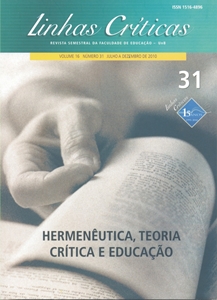Reificação e reconhecimento: reflexões para a pesquisa em educação
DOI:
https://doi.org/10.26512/lc.v16i31.3613Keywords:
Reificação;, Reconhecimento;, ; Axel Honneth;, Pesquisa educacionalAbstract
Neste artigo, propomos desvendar o “reconhecimento prévio do outro” como uma condição não-epistêmica fundamental das pesquisas em educação, evitando certos problemas ocasionados pela reificação, isto é, a atitude de não reconhecer o saber da alteridade. Percebemos, a partir das reflexões de Axel Honneth, a existência de uma instância fundamental: subjacente à perspectiva do conhecimento existe uma condição não-epistêmica que pode se orientar pelos motivos dos outros. Trata-se de uma proposta que foge, portanto, da disputa entre diferentes perspectivas epistemológicas e da polarização ou da contraposição entre elementos subjetivos e objetivos, ambos reificados. Assumir a postura de reconhecimento do outro implica, enfim, o reconhecimento de sua alteridade por intermédio da sua vivência em plenitude. Nesse aspecto, a teoria de Honneth vem preencher uma lacuna no acontecer das pesquisas educacionais, pois até poderíamos arriscar dizer que, sem este acolhimento do outro, qualquer iniciativa estaria sujeita a recair nas malhas da reificação.
Downloads
References
ALVES-MAZZOTTI, Alda Judith. Relevância e aplicabilidade da pesquisa emeducação. Cadernos de Pesquisa, São Paulo, n. 113, p. 39-50, jul. 2001.
DE BRITO, Angela Xavier; LEONARDOS, Ana Cristina. A identidade das pesquisasqualitativas: construção de um quadro analítico. Cadernos de Pesquisa, São Paulo,n. 113, p. 7-38, jul. 2001.
FLICKINGER, Hans-Georg. O ambiente epistemológico da educação ambiental.Revista Educação & Realidade, Porto Alegre, v. 19, n. 2, p. 197-207, jul./dez. 1994.
HONNETH, Axel. Luta por reconhecimento.A gramática moral dos conflitos sociais.Trad. De Luiz Repa. São Paulo: Ed. 34, 2003.
______. Reificación: un estudio en la teoría del reconocimiento. Buenos Aires: Katz, 2007.
______. Observações sobre a reificação. Civitas. Revista de Ciências Sociais. PortoAlegre: Edipucrs, v. 8, n. 1, p. 68-79, jan.-abr. 2008.
______. Patologias da liberdade individual: o diagnóstico hegeliano de época e opresente. Trad.: Luiz Repa. Novos Estudos, São Paulo, Cebrap, n. 66, p. 53-76, jul. 2003.
______. Sofrimento de indeterminação: uma reatualização da filosofía do direito deHegel. Trad.: Rúrion Soares de Melo. São Paulo: Ed. Singular, Esfera Pública, 2007.
JAMESON, F. A cultura do dinheiro. Ensaios sobre globalização. Petrópolis: Vozes, 2001.
______. As marcas do visível.São Paulo: Graal, 1995.
______. Pós-modernidade e sociedade de consumo. Novos Estudos,São Paulo, Cebrap,n. 12, p. 16-26, jun. 1985.
Downloads
Published
How to Cite
Issue
Section
License
Copyright (c) 2016 Linhas Críticas

This work is licensed under a Creative Commons Attribution 4.0 International License.
Authors who publish in this journal agree to the following terms:
-Authors maintains the copyright and grants the journal the right of first publication, the work being simultaneously licensed under the Creative Commons Attribution License which allows the sharing of the work with recognition of the authorship of the work and initial publication in this journal.
- Authors are authorized to enter into additional contracts separately, for non-exclusive distribution of the version of the work published in this journal (eg publish in institutional repository or as a book chapter), with acknowledgment of authorship and initial publication in this journal.
-Authorers are allowed and encouraged to publish and distribute their work online (eg in institutional repositories or on their personal page) at any point before or during the editorial process, as this can generate productive changes as well as increase the impact and the citation of published work (See The Effect of Free Access).



